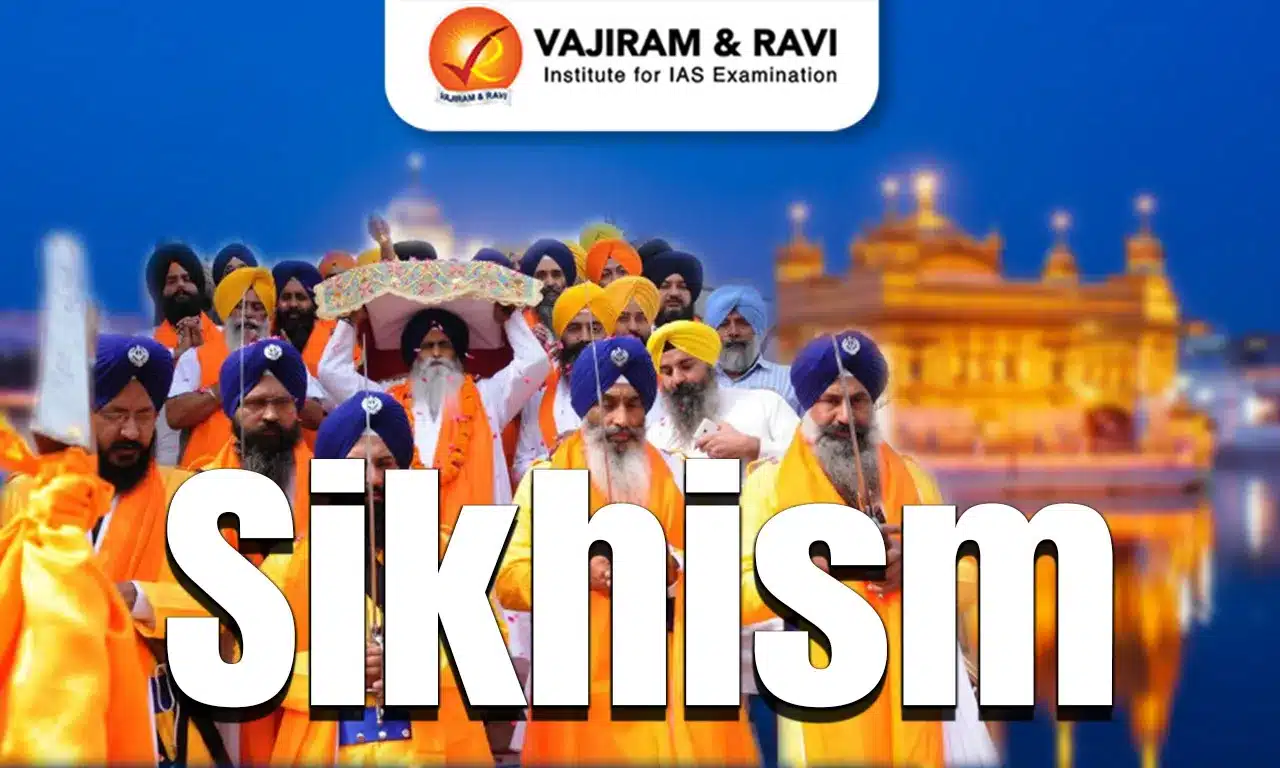Sikhism is one of the largest organized religions in the world, with over 25 million followers globally. It was founded by Guru Nanak Dev in the Punjab region of the Indian subcontinent during the late 15th century. The faith emphasizes monotheism, equality, justice, and service. The term Sikh means "learner" or "disciple," reflecting the religion's focus on spiritual learning and devotion to God.
Key Sikh practices include prayer, meditation (Naam Japna), and community service, exemplified by langars (free community kitchens). The Khalsa, initiated by Guru Gobind Singh, upholds Sikh principles with discipline and courage. Sikhism continues to inspire millions with its message of faith, justice, and humanity.
Sikhism Origin
Sikhism, known as Gurmat ("the Way of the Guru"), is a monotheistic religion that emerged in the Punjab region of the Indian subcontinent during the late 15th century. Founded by Guru Nanak, it ranks as the world's fifth-largest organized religion, with over 25 million adherents globally. Sikhism emphasizes devotion to one formless, eternal God, advocating for a life of honesty, equality, and social justice.
Sikhism History
Sikhism, established by Guru Nanak in the 15th century AD, originated in what is now Punjab. The term Sikh is derived from the Sanskrit word shishya and the Pali root sikkha, both meaning "disciple." In this context, Sikhs are followers of the ten Sikh Gurus, beginning with Guru Nanak. Some interpretations also define Sikh as "the chosen one" or "God’s own."
- Sikhism is one of the youngest major world religions and incorporates elements from both Hinduism and Islam while maintaining its distinct identity.
- It upholds a philosophy of openness and inclusivity, symbolized by the Golden Temple, which welcomes people from all directions.
- Over time, Sikhism has evolved, balancing seemingly contrasting qualities—simplicity with grandeur, martial strength with compassion, and poetry with practicality.
About Guru Nanak
Guru Nanak (1469–1539), the founder of Sikhism, was a spiritual leader and reformer born in Talwandi (now Nankana Sahib, Pakistan). He emphasized devotion to one God, equality, and selfless service. Rejecting ritualism and caste discrimination, he preached a message of unity and compassion. His teachings, compiled in the Guru Granth Sahib, form the foundation of Sikhism.
Teachings of Sikhism
Sikhism is a faith rooted in spiritual devotion and ethical living, emphasizing a strong connection with the divine and service to humanity. Its core principles, including monotheism, equality, selfless service, honest living, and remembrance of God’s name, guide Sikhs toward righteousness, humility, and inner peace.
- Monotheism (Ik Onkar): Sikhism upholds the belief in a single, omnipresent, and formless God. This divine entity is beyond human limitations and is the ultimate source of all creation, guiding individuals towards truth and righteousness.
- Equality: Sikh teachings reject all forms of discrimination based on caste, gender, or religion. Everyone is considered equal in the eyes of God, emphasizing universal brotherhood and social justice as fundamental aspects of human coexistence.
- Seva (Selfless Service): Serving humanity without expecting rewards is a core tenet of Sikhism. Acts of compassion, charity, and community service—such as providing food in langars—are considered pathways to spiritual growth and humility.
- Honest Living (Kirat Karni): Sikhs are encouraged to lead an ethical life by earning an honest livelihood through hard work and sincerity. Wealth and success should be pursued with integrity, without deceit or exploitation of others.
- Naam Japna (Remembrance of God’s Name): Constant meditation and chanting of God’s name (Naam Simran) foster spiritual awareness. This practice helps individuals stay connected to divine consciousness, overcome worldly distractions, and attain inner peace.
Sikhism Practices
Sikhism places great emphasis on living a disciplined life rooted in spiritual devotion, ethical conduct, and service to humanity. Its practices and rituals guide Sikhs in their journey towards self-purification, community engagement, and devotion to the divine. A Sikh’s life revolves around three core fundamental duties.
- Naam Japna (Remembrance of God): Sikhs engage in continuous meditation and chanting of God's name to cultivate spiritual awareness and humility.
- Kirat Karni (Honest Living): Sikhs are encouraged to earn a livelihood through ethical means, rejecting dishonesty, corruption, gambling, and exploitative practices.
- Vand Chhakna (Sharing with Others): Generosity and selfless service are integral, with Sikhs contributing to the welfare of society through charity and community service, including running free kitchens (Langar) in Gurdwaras.
- Five Ks: Sikhs (Khalsa) uphold their faith by wearing the Five Ks: Kesh (uncut hair for spirituality), Kanga (wooden comb for cleanliness), Kara (iron bracelet for righteousness), Kirpan (sword for justice), and Kachera (cotton undergarment for modesty and discipline).
- Sikhs strive to overcome five major vices that foster selfishness and create obstacles in their spiritual connection with God. These include lust, excessive greed, worldly attachments, uncontrolled anger, and arrogance, all of which hinder personal growth and devotion.
Sikhism Rituals
Sikhism follows a set of significant life rituals outlined in the Sikh Rahit Maryada, which serves as the code of conduct for Sikhs. These four key rites of passage mark important transitions in a Sikh's life.
- Naam Karan: The first is the Naam Karan (birth and naming ceremony), conducted in a Gurdwara, where a child’s name is chosen from the Guru Granth Sahib.
- Anand Karaj: The second is Anand Karaj, the Sikh marriage ceremony symbolizing a blissful union.
- Amrit Sanskar: The third rite—regarded as the most crucial rite is Amrit Sanskar, marking initiation into the Khalsa.
- Antim Sanskar: Lastly, the Antim Sanskar (funeral ceremony) signifies acceptance of death as part of divine will.
Ten Sikh Gurus in Sikhism
Ten Sikh Gurus in Sikhism played pivotal roles in shaping the religion’s doctrines and practices. Beginning with Guru Nanak Dev and culminating with Guru Gobind Singh, each Guru left a lasting impact on the community.
|
Sikh Gurus |
Contribution |
|
Guru Nanak Dev (1469–1539) |
Founder of Sikhism; emphasized devotion to one God and equality. |
|
Guru Angad Dev (1504–1552) |
Introduced the Gurmukhi script, standardizing the Punjabi language. |
|
Guru Amar Das (1479–1574) |
Established the Manji and Piri systems to strengthen Sikhism |
|
Guru Ram Das (1534–1581) |
Laid the foundation of Amritsar city, which became a spiritual centre for Sikhs. |
|
Guru Arjan Dev (1563–1606) |
Compiled the Adi Granth, the central religious text, and constructed the Harmandir Sahib (Golden Temple). |
|
Guru Hargobind (1595–1644) |
Constructed Akal Takhat, the Immortal Throne |
|
Guru Har Rai (1630–1661) |
Focused on missionary work and maintained a defensive military stance. |
|
Guru Har Krishan (1656–1664) |
Known for his compassion and service during a smallpox epidemic. |
|
Guru Tegh Bahadur (1621–1675) |
Martyred defending religious freedom against Mughal oppression. |
|
Guru Gobind Singh (1666–1708) |
- Founded the Khalsa in 1699, a collective body of initiated Sikhs, and declared the Guru Granth Sahib as the eternal Guru. - Introduced the five symbols of Sikhism—Kangha (comb), Kesh (long hair), Kada (iron bracelet), Kachcha (underwear), and Kirpan (sword or dagger)—as essential markers of Sikh identity and devotion. |
11th Sikh Guru - Guru Granth Sahib
While there is no human successor to Guru, the Guru Granth Sahib, the holy scripture of Sikhism, is revered as the eternal 11th Guru. It comprises hymns from Sikh Gurus as well as teachings from Hindu and Muslim saints, including those from marginalized communities.
Sikh Institutions
Sikhism has established several key institutions to uphold its religious and administrative framework. These include Takhts and Sikh Gurudwaras.
Takhts
Takhts, meaning 'seats of divine authority,' are five sacred centres in Sikhism that hold religious and administrative significance. These takhts, associated with historical events and Guru teachings, guide the Sikh community in spiritual, social, and political matters.
- Akal Takht in Amritsar.
- Takht Keshgarh Sahib in Anandpur Sahib.
- Takht Patna Sahib in Bihar.
- Takht Hazur Sahib in Maharashtra.
- Takht Damdama Sahib in Punjab.
Gurudwaras
A Gurudwara, meaning "doorway to the Guru," serves as both a place of worship and a community hub for Sikhs. India has numerous Gurudwaras, with five significant Takhts. These sacred sites attract thousands of devotees seeking spiritual guidance.
- Prominent Gurudwaras include the Golden Temple in Amritsar, Bangla Sahib in Delhi, Hemkund Sahib in Uttarakhand, Kartarpur Sahib in Punjab province of Pakistan, and Patna Sahib in Bihar, each holding immense religious and historical significance.
Sikhism Literature
Sikhism has a rich literary tradition, with its core scripture being the Guru Granth Sahib, a sacred text compiled by Guru Arjan, the fifth Sikh Guru. It contains hymns, prayers, and teachings of Sikh Gurus, as well as saints from different spiritual traditions.
- Other important texts include the Dasam Granth, attributed to Guru Gobind Singh, and the Janamsakhis, which narrate the life of Guru Nanak.
- The Rehat Maryada outlines the Sikh code of conduct.
Sikh literature promotes devotion, ethical living, and social justice, serving as a spiritual and philosophical guide for followers.
Sikhism Significance
Sikhism holds immense significance as a faith that emphasizes equality, ethical living, and selfless service. It fosters spiritual growth, humanitarian values, and inner peace while inspiring courage and resilience through its rich history of sacrifice and commitment to justice.
- Promotes Equality and Social Justice: Sikhism rejects caste, gender, and religious discrimination, advocating for universal equality, dignity, and human rights. The principles of fairness and justice are integral to Sikh teachings.
- Emphasizes Spiritual and Ethical Living: The faith encourages honest living (Kirat Karni), selfless service (Seva), and remembrance of God (Naam Japna), guiding individuals toward a morally upright and spiritually fulfilling life.
- Fosters Community Service and Humanitarianism: Sikhs actively engage in charity, such as running free kitchens (Langar) in gurdwaras, disaster relief efforts, and supporting marginalized communities worldwide.
- Encourages Inner Peace and Devotion: Through meditation on God's name, Sikhs cultivate spiritual awareness, self-discipline, and resilience in facing life’s challenges.
- Symbol of Courage and Sacrifice: Sikh history is marked by immense bravery and sacrifices for justice, freedom, and the protection of religious rights, inspiring resilience and fearlessness in its followers.
Last updated on March, 2026
→ UPSC Notification 2026 is now out on the official website at upsconline.nic.in.
→ UPSC IFoS Notification 2026 is now out on the official website at upsconline.nic.in.
→ UPSC Calendar 2026 has been released.
→ UPSC Final Result 2025 is expected to be released soon.
→ Check out the latest UPSC Syllabus 2026 here.
→ Join Vajiram & Ravi’s Interview Guidance Programme for expert help to crack your final UPSC stage.
→ UPSC Mains Result 2025 is now out.
→ UPSC Prelims 2026 will be conducted on 24th May, 2026 & UPSC Mains 2026 will be conducted on 21st August 2026.
→ The UPSC Selection Process is of 3 stages-Prelims, Mains and Interview.
→ Prepare effectively with Vajiram & Ravi’s UPSC Prelims Test Series 2026 featuring full-length mock tests, detailed solutions, and performance analysis.
→ Enroll in Vajiram & Ravi’s UPSC Mains Test Series 2026 for structured answer writing practice, expert evaluation, and exam-oriented feedback.
→ Join Vajiram & Ravi’s Best UPSC Mentorship Program for personalized guidance, strategy planning, and one-to-one support from experienced mentors.
→ Check UPSC Marksheet 2024 Here.
→ UPSC Toppers List 2024 is released now. Shakti Dubey is UPSC AIR 1 2024 Topper.
→ Also check Best UPSC Coaching in India
Sikhism FAQs
Q1. What do Sikhs believe?+
Q2. Who was the founder of Sikhism?+
Q3. Can Sikhs eat meat?+
Q4. Is Sikhism closer to Hinduism or Islam?+
Q5. What is the youngest religion?+















